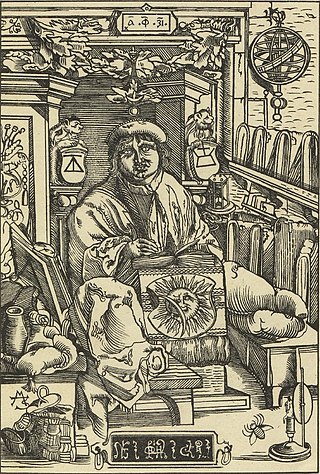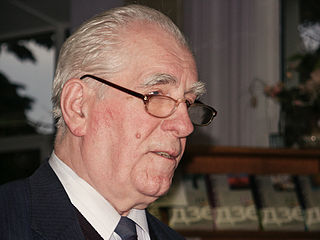Related Research Articles

Belarusian is an East Slavic language. It is one of the two official languages in Belarus, alongside Russian. Additionally, it is spoken in some parts of Russia, Lithuania, Latvia, Poland, and Ukraine by Belarusian minorities in those countries.
Ruthenian is an exonymic linguonym for a closely related group of East Slavic linguistic varieties, particularly those spoken from the 15th to 18th centuries in the Grand Duchy of Lithuania and in East Slavic regions of the Polish–Lithuanian Commonwealth. Regional distribution of those varieties, both in their literary and vernacular forms, corresponded approximately to the territories of the modern states of Belarus and Ukraine. By the end of the 18th century, they gradually diverged into regional variants, which subsequently developed into the modern Belarusian, Ukrainian, and Rusyn languages.

Francysk Skaryna was a Belarusian humanist, physician, and translator. He is known to be one of the first book printers in the Grand Duchy of Lithuania and in all of Eastern Europe, laying the groundwork for the development of the Belarusian izvod of the Church Slavonic language.
The phonological system of the modern Belarusian language consists of at least 44 phonemes: 5 vowels and 39 consonants. Consonants may also be geminated. There is no absolute agreement on the number of phonemes; rarer or contextually variant sounds are included by some scholars.

Francis Skaryna Belarusian Library and Museum in north London, England, is the only library outside Belarus to collect exclusively in the field of Belarusian studies. It was formally established as an independent institution in 1971 and is owned by a charitable trust. The library — alongside the Belarusian Catholic Mission in England, Anglo-Belarusian Society and the Journal of Belarusian Studies — had a significant role in encouraging Belarusian studies in the United Kingdom and outside Belarus in second half of the 20th century.

Ceslaus Sipovich was a bishop of the Belarusian Greek Catholic Church and a notable Belarusian émigré social and religious leader.

Alexander Nadson was the Apostolic Visitor for Belarusian Greek-Catholic faithful abroad, scholar, translator and a notable Belarusian émigré social and religious leader.

Belarusians in the United Kingdom are Belarusians living in the United Kingdom and British people of Belarusian background or descent. The 2001 UK census recorded 1,154 Belarus-born people living in the UK. The 2011 census recorded 4,031 Belarus-born people resident in England, 102 in Wales, 211 in Scotland and 62 in Northern Ireland. Nowadays, organised community life exists only in London.

The first translation into Belarusian was by Francysk Skaryna. He printed his first book titled The Psalter, in the Old Belarusian recension of Church Slavonic on August 6, 1517, in Prague. He continued his printing work in Vilnius. The culmination of his life's work was a printing of the Bible in the Old Belarusian recension of Church Slavonic. From 1517 to 1519 he printed 23 books of the Bible. Belarusian bible was the first translation in an Eastern Slavic language and one of the first among European languages.
The Anglo-Belarusian Society is one of the oldest Belarus-related organisations in the UK with an object of “diffusion, interchange and publication of knowledge relating to the Belarusian people, their land, history and culture”.

Nil Symonavich Hilevich was a Belarusian poet, a professor in the Belarusian State University, the author of more than 80 books of poetry, publications, and translations, and one of the founders of the Francišak Skaryna Belarusian Language Society.
Archimandrite Leo Haroshka, MIC was a Belarusian Catholic priest of the Byzantine rite, religious and social activist, researcher of the history of religion in Belarus and one of the founders of the Francis Skaryna Belarusian Library in London. His pseudonyms are LA Іskra, Anatoí Žmienia, Prakop Cavalieri and others.
Guy Reginald Pierre Picarda was a scholar and promoter of Belarusian culture and music, a founder of the Anglo-Belarusian Society and the Journal of Belarusian Studies.
Robert Auty, FBA was an English philologist who specialised in Slavonic languages.

Arnold Barratt McMillin is a British scholar of Belarusian and Russian studies, Emeritus Professor of Russian Literature, and the author of the first English-language history of Belarusian literature.
Jim Dingley is a researcher and promoter of Belarusian culture in the UK as well as a translator of Belarusian literature.

The Journal of Belarusian Studies is an English language academic journal in the field of Belarusian studies. It was described as “one of the longest lasting Belarusian publishing projects in Great Britain and one of the most authoritative periodicals in the field of Belarusian studies in the world”.

Adam Maldzis was a Belarusian historian, literary critic, author and journalist. He was described as "a patriarch of Belarusian humanities", "an excellent connoisseur of literature" and "a living bridge between Belarus and the scholars of Belarusian studies around the world". He was “the author of unique studies of the Old Belarusian literature”.
Paval Navara, also romanised as Paul Navara, was a Belarusian émigré public figure and co-founder of the Anglo-Belarusian Society.
Belarusian studies is a field of research dedicated to Belarusian language, literature and culture.
References
- 1 2 3 4 5 Гардзіенка, Наталля (2010). Беларусы ў Вялікабрытаніі [Belarusians in Great Britain, by Natalla Hardzijenka]. Minsk: Згуртаванне беларусаў свету Бацькаўшчына. p. 477. ISBN 978-985-6887-63-8.
- ↑ Akiner, S. (1976-12-16). "Mayo, P. J. A Grammar of Byelorussian. Anglo-Byelorussian Society in association with the Department of Russian and Slavonic Studies, University of Sheffield, Sheffield, 1976. 66 pages. Bibliography". Journal of Belarusian Studies. 3 (4): 381–381. doi: 10.30965/20526512-00304012 . ISSN 0075-4161.
- ↑ "Peter J. Mayo | The Journal of Belarusian Studies". belarusjournal.com. Retrieved 2021-05-29.
- 1 2 Zadencka, Maria; Plakans, Andrejs; Lawaty, Andreas, eds. (2015). East and Central European History Writing in Exile 1939-1989. On the Boundary of Two Worlds. Vol. 39. p. 126. ISBN 978-90-04-29969-6.
- ↑ Mayo, Peter (1982). "Foreword". Journal of Belarusian Studies. 5 (2). Retrieved 21 July 2021.
- ↑ Т.М. Суша "Мэё, Пітэр Джон" - [Mayo, Piter John, by T.M. Susha]. Беларуская энцыклапедыя ў 18 тамах [Belarusian Encyclopedia, in 18 volumes]. Vol. 11. Minsk: Bielaruskaja encyklapiedyja. 2000. p. 57.
- ↑ English-Belarusian Disctionary (PDF). Minsk: Vysheishaya Shkola Publishing House. 2013.
- ↑ "Arnold McMillin: "When Belarusians came, they started with the library"". Francis Skaryna Belarusian Library and Museum. 2016-06-16. Archived from the original on 2021-11-09. Retrieved 2021-05-29.
- ↑ "The Peter Mayo Prize in Russian" (PDF). p. 8. Retrieved 2021-07-12.
{{cite web}}: CS1 maint: url-status (link)